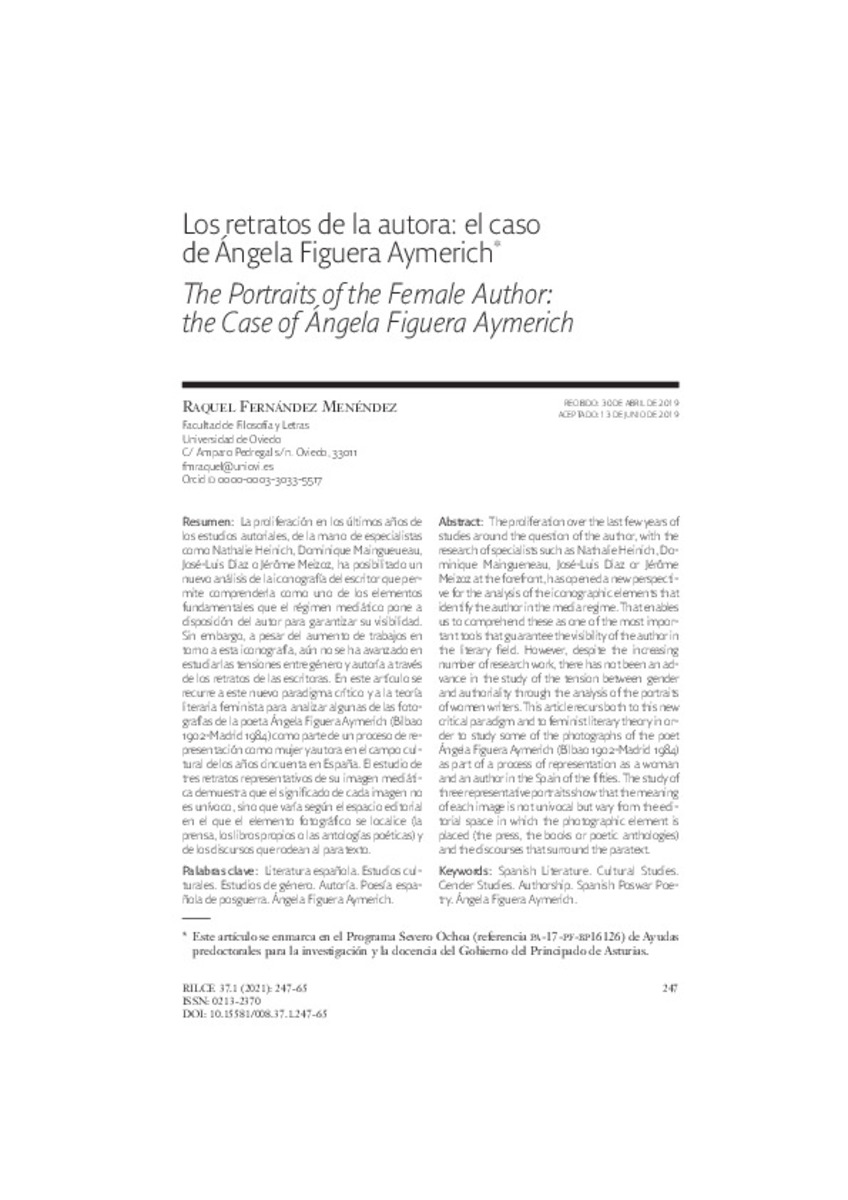Full metadata record
| DC Field | Value | Language |
|---|---|---|
| dc.creator | Raquel | - |
| dc.date.accessioned | 2020-12-21 | - |
| dc.date.accessioned | 2021-08-30T07:28:12Z | - |
| dc.date.available | 2021-08-30T07:28:12Z | - |
| dc.date.issued | 2020 | - |
| dc.identifier.citation | Fernández-Menéndez, R. (Raquel). "Los retratos de la autora: el caso de Ángela Figuera Aymerich". Rilce. Revista de Filología Hispánica. 37 (1), 2020, 247 - 65 | es |
| dc.identifier.issn | 0213-2370 | - |
| dc.identifier.uri | https://hdl.handle.net/10171/61842 | - |
| dc.description.abstract | The proliferation over the last few years of studies around the question of the author, with the research of specialists such as Nathalie Heinich, Dominique Maingueneau, José-Luis Diaz or Jérôme Meizoz at the forefront, has opened a new perspective for the analysis of the iconographic elements that identify the author in the media regime. That enables us to comprehend these as one of the most important tools that guarantee the visibility of the author in the literary field. However, despite the increasing number of research work, there has not been an advance in the study of the tension between gender and authoriality through the analysis of the portraits of women writers. This article recurs both to this new critical paradigm and to feminist literary theory in order to study some of the photographs of the poet Ángela Figuera Aymerich (Bilbao 1902-Madrid 1984) as part of a process of representation as a woman and an author in the Spain of the fifties. The study of three representative portraits show that the meaning of each image is not univocal but vary from the editorial space in which the photographic element is placed (the press, the books or poetic anthologies) and the discourses that surround the paratext. | en_US |
| dc.description.abstract | La proliferación en los últimos años de los estudios autoriales, de la mano de especialistas como Nathalie Heinich, Dominique Maingueueau, José-Luis Diaz o Jérôme Meizoz, ha posibilitado un nuevo análisis de la iconografía del escritor que permite comprenderla como uno de los elementos fundamentales que el régimen mediático pone a disposición del autor para garantizar su visibilidad. Sin embargo, a pesar del aumento de trabajos en torno a esta iconografía, aún no se ha avanzado en estudiar las tensiones entre género y autoría a través de los retratos de las escritoras. En este artículo se recurre a este nuevo paradigma crítico y a la teoría literaria feminista para analizar algunas de las fotografías de la poeta Ángela Figuera Aymerich (Bilbao 1902-Madrid 1984) como parte de un proceso de representación como mujer y autora en el campo cultural de los años cincuenta en España. El estudio de tres retratos representativos de su imagen mediática demuestra que el significado de cada imagen no es unívoco, sino que varía según el espacio editorial en el que el elemento fotográfico se localice (la prensa, los libros propios o las antologías poéticas) y de los discursos que rodean al paratexto. | es_ES |
| dc.language.iso | spa | - |
| dc.publisher | Servicio de Publicaciones de la Universidad de Navarra | es_ES |
| dc.rights | info:eu-repo/semantics/openAccess | es_ES |
| dc.subject | Literatura española | - |
| dc.subject | Estudios culturales | - |
| dc.subject | Estudios de género | - |
| dc.subject | Autoría | - |
| dc.subject | Poesía española de posguerra | - |
| dc.subject | Ángela Figuera Aymerich | - |
| dc.title | Los retratos de la autora: el caso de Ángela Figuera Aymerich | es_ES |
| dc.title.alternative | The Portraits of the Female Author: the Case of Ángela Figuera Aymerich | en_US |
| dc.type | info:eu-repo/semantics/article | es_ES |
| dc.identifier.doi | 10.15581/008.37.1.247-65 | - |
| dadun.citation.endingPage | 65 | - |
| dadun.citation.number | 1 | - |
| dadun.citation.publicationName | Rilce. Revista de Filología Hispánica | - |
| dadun.citation.startingPage | 247 | - |
| dadun.citation.volume | 37 | - |
Files in This Item:
Statistics and impact
Items in Dadun are protected by copyright, with all rights reserved, unless otherwise indicated.






